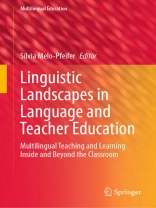This book offers an international account of the use of linguistic landscapes to promote multilingual education, from primary school to the university, and in teacher education programs. It brings linguistic landscapes to the forefront of multilingual education in school settings and teacher education, expanding the disciplinary domains through which they have been studied. Drawing on multidisciplinarity and placing linguistic landscapes in the field of language (teacher) education, this book presents empirical studies developed in eleven countries: Australia, France, Germany, Israel, Japan, Mozambique, The Netherlands, Portugal, Russia, Spain, and The United States. The chapters illustrate how multilingual pedagogies can be enhanced using linguistic landscapes in mainstream education and are written by partners of the Erasmus Plus project Lo CALL “LOcal Linguistic Landscapes for global language education in the school context”.
Tabela de Conteúdo
Chapter 1. Introduction. Linguistic landscapes in language (teacher) education: Multilingual teaching and learning inside and beyond the classroom (Sílvia Melo-Pfeifer).-
Part I – The Exploration of Linguistic Landscapes in the Classroom
.- Chapter 2. Languages around us: (in)visibility matters (Monica López and Melinda Dooly).- Chapter 3. Walking Linguistic Landscapes as Ways to Experience Plurality: A Visual Ethnography into Plurilingualism with Elementary School Children in Japan (Mayo Oyama, Danièle Moore and Daniel Roy Pearce).- Chapter 4. Empowering students and raising critical language awareness through a collaborative multidisciplinary project (Sonia Cadi, Latisha Mary, Maria Siemushyna and Andrea Young).- Chapter 5. Thinking allowed: linguistic landscapes-based projects for higher-order and critical thinking skills (Klaudia A. Kruszynska and Melinda Dooly).-
Part II – Linguistic landscapes in multilinguallearning and teaching environments
.- Chapter 6. Is there a place for global citizenship education in the exploration of linguistic landscapes? An analysis of educational practices in five European countries (Mónica Lourenço, Joana Duarte, Francisco P. Silva and Bruna Batista.- Chapter 7. Linguistic landscape of Maputo: A space for a pedagogical exploration of multilingualism (Perpétua Gonçalves and Manuel Guissemo).- Chapter 8. The Lo CALL App: a mobile tool to promote learning from and about linguistic landscapes (Margarida M. Marques, Mónica Lourenço, Lúcia Pombo, Alexandra das Neves, Dionísia Laranjeiro and Filomena Martins).-
Part III – Teachers and students’ voices on linguistic landscapes
.- Chapter 9. Mediation of Language Attitudes through Linguistic Landscapes in Minority Language Education (Joana Duarte, Sibrecht Veenstra and Nelly van Dijk).- Chapter 10. Teacher and student perspectives on the use of linguistic landscapes as pedagogic resources for enhancing language awareness: a focus on the development of cognitive and affective dimensions (Lisa Maria Brinkman and Sílvia Melo-Pfeifer).- Chapter 11. Educational possibilities of linguistic landscapes exploration in a context of pre-service teacher education (Ana Isabel Andrade, Filomena Martins, Susana Pinto and Ana Raquel Simões).- Chapter 12. The co-construction of the concept ‘linguistic landscape’ by language educators in an online course (Maria Helena Araújo e Sá, Raquel Carinhas, Sílvia Melo- Pfeifer and Ana Raquel Simões).-
Part IV – Expanding from linguistic landscapes in education scenarios
.- Chapter 13. Sensescapes and what it means for language education (Josh Prada).- Chapter 14. Material culture inside and beyond the multilingual classroom: theoretical and pedagogical perspectives (Larissa Aronin, Daria Bylieva and Victoria Lobatyuk).- Chapter 15. The visibility of languages – connecting schools to communities (Alice Chik).- Chapter 16. Virtual linguistic landscapes from below: A hashtag analysis of the European Day of Languages (Sarah Mc Monagle).- Chapter 17. Conclusion: Linguistic Landscapes in Education – Where do we go now? (Mónica Lourenço and Sílvia Melo-Pfeifer).
Sobre o autor
Sílvia Melo-Pfeifer is Full Professor at the University of Hamburg (Germany) in the field of language teacher education (French and Spanish). Her research interests include pluralistic approaches to foreign language learning and teaching and in teacher education, heritage language, and multilingual (online) interaction. She co-edited the book “Visualising Multilingual Lives: More Than Words, ” 2018 (Multilingual Matters) and participated in numerous international projects. She coordinated the project Lo CALL (“LOcal Linguistic Landscapes for global language education in the school context”).












